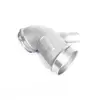Mobile:+86-311-808-126-83
Email:info@ydcastings.com
car oil catcher
The Importance of Car Oil Catchers A Comprehensive Overview
In the realm of automotive maintenance, ensuring that your vehicle runs smoothly and efficiently is of paramount importance. One often overlooked yet integral component in this process is the car oil catcher. Whether you are an experienced mechanic or a casual car owner, understanding the role and benefits of an oil catcher can greatly enhance your vehicle's longevity and performance.
What is an Oil Catcher?
An oil catcher, often referred to as an oil catch can or oil breather, is a device designed to capture excess oil vapors and contaminants before they can re-enter the engine's intake system. Typically mounted between the crankcase and the intake manifold, this tool serves as a filtration system that prevents potentially harmful substances from circulating back into the combustion chamber.
Why You Need an Oil Catcher
1. Prevention of Engine Sludge Over time, oil vapors can mix with fuel and air, creating sludge that can accumulate in the engine. This buildup can lead to a variety of issues, including reduced efficiency, overheating, and ultimately, engine failure. An oil catcher captures these vapors, significantly reducing the risk of sludge formation.
2. Enhanced Engine Performance By filtering out oil vapors and contaminants, an oil catcher helps maintain a clean intake system. A cleaner intake allows for better air-fuel mixtures, which can improve combustion efficiency and ultimately enhance engine performance. Your vehicle's power delivery can become more consistent, providing a smoother driving experience.
3. Environmental Benefits An oil catcher also plays a vital role in reducing harmful emissions. By preventing oil and other contaminants from entering the atmosphere, this device contributes to a more environmentally friendly operation. For those who are eco-conscious, using an oil catcher is a step towards responsible vehicle maintenance.
car oil catcher

4. Cost Savings Implementing an oil catcher can save you money in the long run. By preventing engine wear and tear caused by oil buildup and contamination, it reduces the likelihood of costly repairs and extends the lifespan of your components. Moreover, a well-maintained engine can have improved fuel efficiency, leading to further savings at the pump.
How to Choose the Right Oil Catcher
When looking for the ideal oil catcher for your vehicle, several factors should be taken into account
- Compatibility Ensure that the oil catcher is compatible with your specific make and model. Some vehicles may have unique configurations that require tailored solutions. - Capacity Different oil catchers come with varying capacities. Consider your driving habits; if you frequently engage in high-performance driving or racing, a larger capacity may be necessary.
- Material Opt for catch cans made from high-quality materials such as aluminum or stainless steel. These materials tend to be more durable and resistant to the corrosive effects of oil.
- Ease of Installation Some oil catchers are designed for easy installation, often requiring no modifications to your vehicle. This is a crucial factor for DIY enthusiasts who prefer to handle maintenance themselves.
Conclusion
In conclusion, a car oil catcher is a valuable addition to any vehicle owner’s maintenance toolkit. By preventing sludge formation, enhancing engine performance, contributing to environmental sustainability, and offering cost savings, oil catchers prove to be worthy investments. As the automotive industry continues to evolve towards higher efficiency and lower emissions, integrating an oil catcher into your regular maintenance routine may very well be one of the smartest moves you can make for your vehicle. Whether you are a seasoned gearhead or a casual driver, recognizing the importance of such systems will undeniably contribute to a healthier, more reliable car.
-
Why Should You Invest in Superior Pump Castings for Your Equipment?NewsJun.09,2025
-
Unlock Performance Potential with Stainless Impellers and Aluminum End CapsNewsJun.09,2025
-
Revolutionize Your Machinery with Superior Cast Iron and Aluminum ComponentsNewsJun.09,2025
-
Revolutionize Fluid Dynamics with Premium Pump ComponentsNewsJun.09,2025
-
Optimizing Industrial Systems with Essential Valve ComponentsNewsJun.09,2025
-
Elevate Grid Efficiency with High-Precision Power CastingsNewsJun.09,2025











